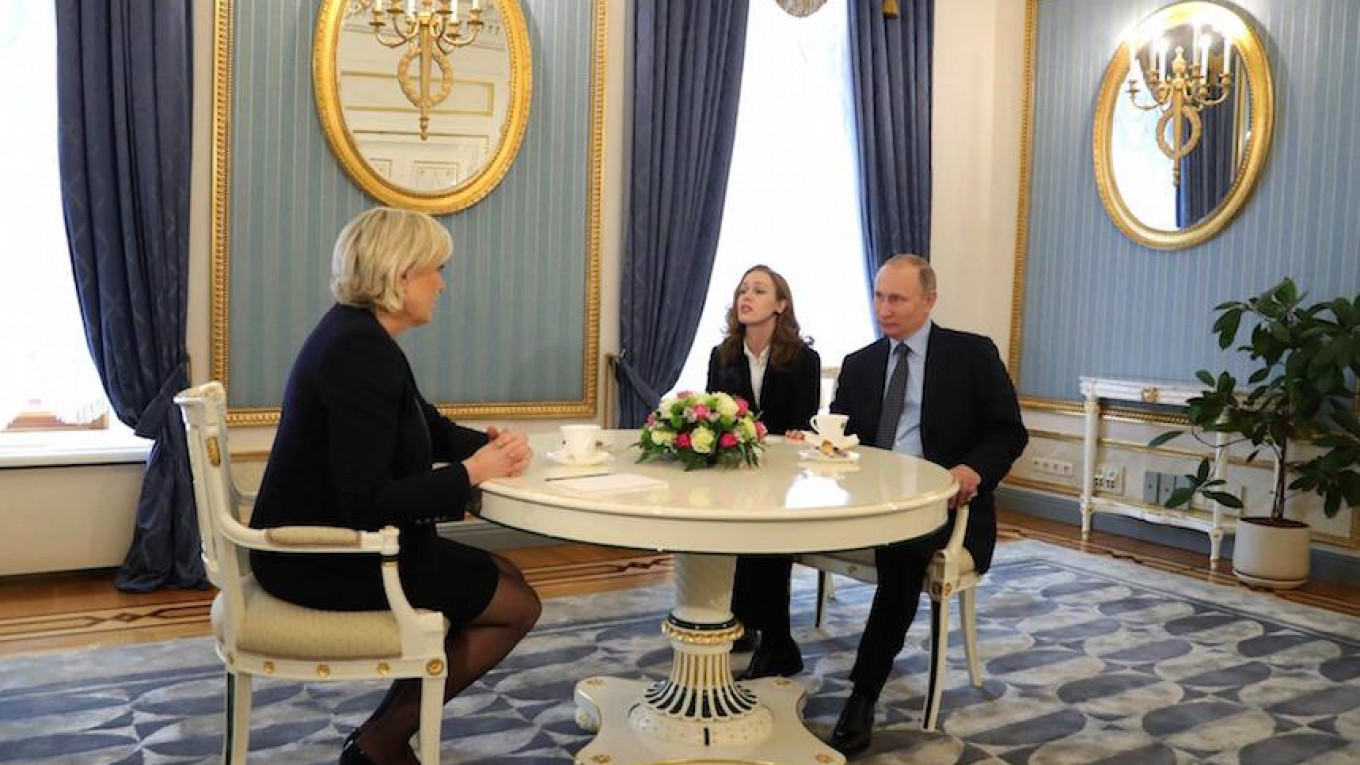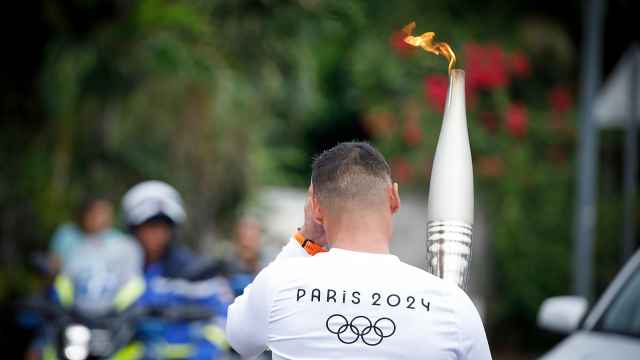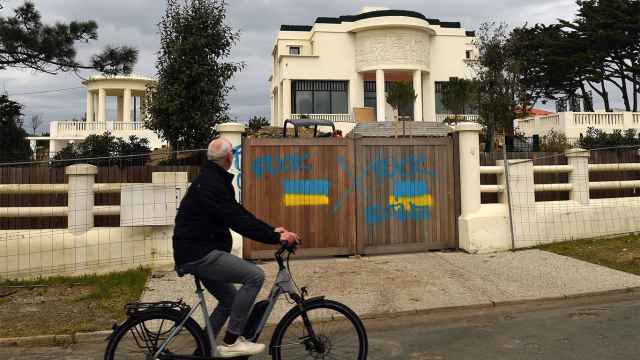What urgent issue could have forced Marine Le Pen, a far-right candidate in the French presidential election, to take a day off from the campaign trail for a visit to Moscow? Meeting members of the Russian parliament was not it.
But it is now clear that the whole thing was a set up for her first official tete-a-tete with Russia’s President Vladimir Putin.
The meeting was intentionally high-profile and extensive media coverage both in Russia and in France maximized its effect. It also represented a noteworthy breach of Russian presidential protocol: Typically, Putin’s facetime is restricted to sitting (and occasionally former) heads of state and government, foreign ministers of major powers (U.S., Germany, France and China), CEOs of major energy internationals (BASF, ExxonMobil) and Putin’s personal friends (Kissinger).
Meeting just a regular member of the European Parliament — even if she is running for president — does not make the cut.
What is less clear, however, is what the Kremlin hoped to gain from the publicity stunt. Was the meeting an attempt to impress French or Russian voters, who will go to polls in 2018? Less clear still, is whether the meeting with Putin — less than a month before the vote on April 23 — will boost or undermine Le Pen’s chances at the ballot.
But whether Moscow is seriously expecting to sway the French vote in favor of Le Pen is not entirely clear. She has been sliding in the polls and has recently lost her formidable lead to Macron. And reliable predictions consistently show her losing to him decisively in the run-off.
While meeting Putin may boost her credibility as an international player, there is no evidence that Putin’s endorsement may arrest her slide in the polls. While her voters are committed, Le Pen has yet to show that she could broaden her support base enough to win the runoff.
Macron may seem like an ideal opponent for the nationalist Le Pen. He is a former investment banker for Rothschild who represents the interests of “savage globalization” that Le Pen rails against. But she would have to sway a significant number of center-right and center-left voters with her message of economic nationalism to defeat him. It is a tall order.
Moscow’s much more realistic bet on having a pro-Putin candidate win the French presidency may have died in the corruption and embezzlement scandal that engulfed Francois Fillon, Putin’s personal friend and the candidate from the center right party “Les Republicans.”
On the one hand, it may seem like Moscow is crossing a threshold in its attempts to influence elections in key EU countries by endorsing a candidate. And it is doing this at the time of heightened Western concerns over covert Russian meddling in the United States, as well as Russian propaganda efforts to boost far-right, anti-EU political forces in France, Germany, Italy and the Netherlands.
Moscow is running a full-fledged media campaign in support of Marine Le Pen and Francois Filion in the French presidential election with both candidates publicly advancing positions that advance Russia’s geopolitical interests on Ukraine, Crimea, European security and sanctions.
There are credible reports that Russia is using hacking and “fake news” to undermine the campaign of Emmanuel Macron, another leader in the French presidential race who takes a decidedly pro-EU stance and criticizes Russian actions in Ukraine and Syria (as France’s former economic minister he was more open to engaging Moscow).
Against this background, Putin’s sudden meeting with Le Pen looks like a flamboyant way of telling Europe: Moscow will no longer shy from supporting anti-EU forces that embrace the Kremlin’s worldview.
Given Le Pen’s calls for withdrawing from the EU and the Eurozone, this is as close as Russia can get to a political declaration of war — Putin’s comments that “our European and American partners” also meet with different political forces ring hollow.
German Chancellor Angela Merkel did meet with Francois Filion and Emmanuel Macron after their official entry into the race, and Marine Le Pen was spotted at Trump Tower in New York during the transition, but the only evidence of Western meddling in the French election is Breitbart News’ effusive coverage of Le Pen.
Putin’s initial hope was former French President Nicolas Sarkozy, another leader of Les Republicans, but he unexpectedly lost in the primaries.
Fillon seemed a clear front runner for about two months, and Moscow was much more circumspect in its efforts to boost his campaign and discredit his opponents. But Fillon became ensnared in one corruption scandal after another and now has no discernable path to victory.
From this perspective, Putin’s meeting with Le Pen may look like an act of desperation or an act of defiance in the face of a likely political defeat — enough to rattle the EU elites and sow confusion, but not enough to achieve the overarching political goal of disrupting the Western unity on Russia sanctions.
There is also a domestic political dimension in Russia to having Le Pen strut through Moscow on short notice. It shows to the Russian public that the Kremlin has allies in Europe, who share and support its worldview and its “traditional European values.”
Creating the impression that Russia can meddle in European elections and even stake a claim to the presidency in a country that is a founding member of the EU boosts Putin standing as “the most powerful man in the world”. The Kremlin may not win the French presidency, but it must not lose the Russian one.
A Message from The Moscow Times:
Dear readers,
We are facing unprecedented challenges. Russia's Prosecutor General's Office has designated The Moscow Times as an "undesirable" organization, criminalizing our work and putting our staff at risk of prosecution. This follows our earlier unjust labeling as a "foreign agent."
These actions are direct attempts to silence independent journalism in Russia. The authorities claim our work "discredits the decisions of the Russian leadership." We see things differently: we strive to provide accurate, unbiased reporting on Russia.
We, the journalists of The Moscow Times, refuse to be silenced. But to continue our work, we need your help.
Your support, no matter how small, makes a world of difference. If you can, please support us monthly starting from just $2. It's quick to set up, and every contribution makes a significant impact.
By supporting The Moscow Times, you're defending open, independent journalism in the face of repression. Thank you for standing with us.
Remind me later.







